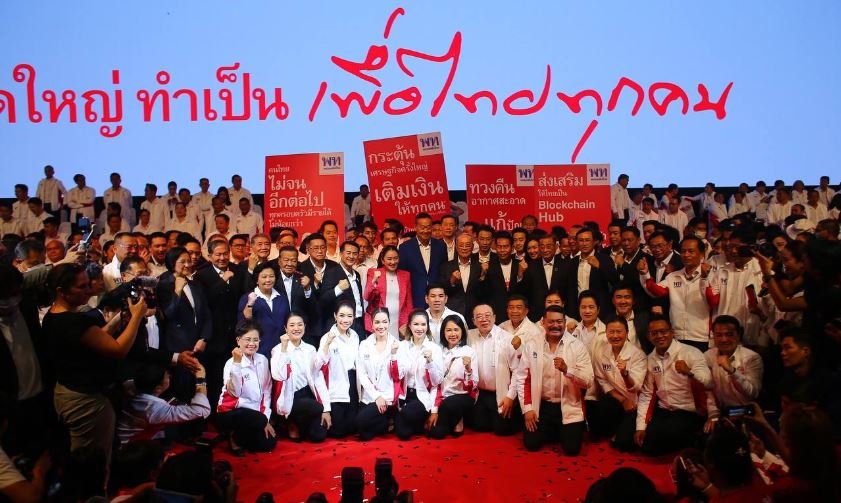The Pheu Thai Party is the most popular overall, according to Nation Poll’s first countrywide poll, but due to the large number of voters who are still undecided, the party will fall short of its goal of winning the general election in 2023 by a wide margin.
From April 7 to April 12, the poll was administered to 39,687 participants across eight regional zones and Bangkok’s 33 constituencies.

18 important topics of analysis were developed in response to the survey results [see accompanying charts]:
1) Pheu Thai is the most well-liked party in both constituency and party-list elections according to the overall national poll, which is followed by the Move Forward Party.
The survey was conducted from April 7 to April 12, not long after Pheu Thai stated on April 5 that it will provide 50 million Thais who are 16 years of age and older with 10,000 baht digital wallets. For more than a week, the digital wallet policy was the topic du jour.
The most often mentioned argument given by respondents was that they would select their preferred party mostly based on its policies. Pheu Thai’s popularity is thought to have increased as a result of the digital wallet policy, particularly in Bangkok.
2) Srettha Thavisin, the second Pheu Thai candidate for prime minister, is one of the top four contenders for the position when he formally declared his candidacy on April 5. He also outlined the party’s position on digital wallets.
3) General Prayut Chan-o-cha, the outgoing prime minister, is one of the top three candidates for prime minister, trailing only Paetongtarn Shinawatra of Pheu Thai and Pita Limjaroenrat of Move Forward.
Prayut was the most well-liked in 11 provinces in the upper southern region. Conservative Southern voters continue to support the UTNP’s nominee for prime minister.
4) In the central and western zone, lower northern zone, higher southern zone, and three southern border provincial zones, respondents who were unsure about their party-list and constituency vote made up the largest group.
5) The upper North and upper Northeast are the only two zones where Pheu Thai is guaranteed to win by a wide margin.
6) Jurin Laksanawisit, the Democrat Party’s nominee for prime minister, is Prayut’s closest rival in Bangkok. However, on the national stage, Prayut significantly outperforms Jurin because Prayut is the respondents’ top pick in 11 provinces in the upper southern region, which raises his standing overall.
7) In the party-list and constituency elections in Bangkok, the Democrat Party is in third place after Pheu Thai and Move Forward. However, Prayut’s UTNP, which is affiliated with conservative parties, has a lower rating than the Democrats do.
After intensifying their election campaigns from April 4 to April 12, or almost at the same time as the Nation Poll poll from April 7 to April 12, Democrats’ popularity has soared ahead of the UTNP.
8) Khunying Sudarat Keyuraphan of Thai Sang Thai and General Prawit Wongsuwan of Palang Pracharath are less well-liked than Jurin both in Bangkok and nationally.
9) Nearly a third of respondents—more than 32%—in Bangkok and across the country are unsure of their vote. Based on their political inclinations—conservative or liberal—they may be examined.
– Conservative respondents don’t plan to vote for Pheu Thai or Move Forward but aren’t sure whether to support the UTNP or Democrats.
– Liberal responders who aren’t sure yet between Pheu Thai and Move Forward don’t plan to support the conservative side.

10) Other parties still have an opportunity to intensify their campaigns in the final days leading up to the May 14 election because the proportion of respondents who are undecided is over 32%, or over one-third.
11) Conservative parties are more likely to steal votes from each other than liberal parties are to do the same.
For instance, Songkhla and Nakhon Si Thammarat provinces in the South have equal popularity ratings for the Democrat Party and UTNP. The Bhumjaithai Party also supports them, which increases Pheu Thai’s prospects of triumphing there due to the divide of conservative votes.
12) Many respondents in the liberal camp hesitate to vote for Move Forward out of concern that doing so could prevent Pheu Thai from winning by a wide margin. They worry that Pheu Thai would lose to either UTNP or Palang Pracharath without a decisive victory.
13) For both party-list and constituency elections, the largest group of responders in the three southern border provinces were those who were still unsure.
14) Respondents who had already decided whether to vote for Pheu Thai or Move Forward were quite vocal in their responses, whilst those who backed a conservative party appeared reluctant to publicly state their position.
15) The predicted number of party-list House seats for the parties might be determined using the findings of the party-list voting poll conducted by Nation Poll in the first round of the survey. 32% of the respondents are still unsure, though.
16) The results of the poll on constituency voting in the eight regional zones simply showed how popular the parties were there. The results, however, could not be utilized to forecast House seats in the constituencies in accordance with statistical principles because the first round of polls in the provinces were not conducted based on constituencies. The results of the second round of polls [will be based on 400 constituencies across the country] can be used to forecast House seats based on constituencies.]
17) According to statistical standards, the findings of the polls conducted in 8 regional zones and the 33 seats of Bangkok revealed that Pheu Thai has not yet reached its target of winning by a landslide. The survey results indicate that Pheu Thai might or might not triumph by a wide margin.
18) A favorable change in the proportion of voters who are still uncertain is the only thing that could assist Pheu Thai win by a wide margin.
In conclusion, depending on their campaigns in the final few weeks leading up to the election, all parties still have a chance to win over the people.
how the poll was put together
The Nation Group organized two rounds of the most extensive surveys ever as part of the project “Road to the Future: Election 2023 Thailand’s Future” in collaboration with top academics and experts from top universities, non-governmental organizations, and the commercial sector.
39,687 respondents took part in the first round of polls from April 7 to April 12. The results are as follows:
Bangkok: 35,411 respondents, with a minimum of 1,072 respondents in each of the 33 constituencies.
North Upper: 406 respondents
417 responses from the Lower North
723 responders from the Midwest and West
Southeast: 420 responders
722 responders from the Upper Northeast
Northeastern Lower: 726 responders
11 provinces in the upper south had 461 responders.
3 provinces along the southern border: 401 respondents
The so-called stratified five-stage random sampling approach for regions and the stratified three-stage random sampling method for Bangkok were both used to sample the respondents.
The error margin for the sample of respondents from 31 provinces in 8 regional zones is 5%, while the error margin for the sample of 33 constituencies in Bangkok is 3%.
Population data and sampling weight are the foundation of the analysis.




